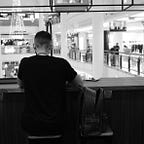How to Turn Around a Crisis of Confidence
When I was younger, I watched many design leaders join legacy companies and, for lack of a better term, “hide” after 40. I often wondered why they did this — the “rest and vest” corporate acquiescence — but now that I’m past 40, I understand.
In spring of this year, I was looking for a new position, and specifically, something that would bring me back in-house. Not because the challenges were less daunting (I still love a good challenge), but in big part because it was safe. The roles I was considering had a guaranteed salary, established guidelines, processes and plans, and an existing product that I’d be expected to improve. After nearly 10 years of consulting where I had worked to build and establish various studios, I was looking forward to a position with a little less ambiguity and a more predictable future.
But then — as has happened so many times in my career — a random conversation changed all of that.
Before summer, I visited Austin and sat down with Jon Kolko, an old university friend and the author of multiple books on design. Jon founded the Design Institute AC4D, and is easily one of the best Academic-Practitioner minds in the industry. He’s also one of the founders of Modernist and someone that I have looked up to throughout my career.
So when we sat down for beers one day in Austin (Texas) and his first questions was, “What is it going to take for you to come work at Modernist?”, I was floored, humbled…and honestly scared.
We talked for a while, and his premise was simple: Modernist, he argued, had some of the best design talent a studio could have, and after reviewing their work, I had to agree. But they didn’t have the tools to build and extend their client base and professionalise their internal systems. This is exactly what I had done for Raft, my own design studio, and later for argo.
Jon asked me to come onboard and help them scale. Modernist’s parent company was a huge development staffing agency called Gorilla Logic, and they were in the process of integrating. So I’d help drive the entire new company strategy, moving from staff augmentation to complete end-to-end delivery.
If you ever want to question your skills, get hired by someone you admire for a challenge just outside your skill level. Professionally terrifying.
After weighing some amazing offers from different product companies in the Big Tech category, I decided, despite my fear, to join Modernist. Looking at their work and team, they clearly offered a kind of potential that no one else could: to build, scale, and help direct the strategy of yet another top global design studio. It’s rare to get this chance once in a career, but for me it was the third time. And for the third time it felt like I had to take the risks and ask…
“What if this works?”
Two months in I’m still scared; still in the middle of a crisis of confidence. I’m scared to let down a friend, and someone I look up to. But each day I wake up and ask, “But what if this works? What if I can make this happen?” I do this to stay in the mindset of choosing possibility.
This week, several conversations in rapid succession seemed to speak directly to that crisis of confidence, prompting me to share a bit of advice that I think most design leaders need to hear. One of these conversations, surprisingly, was based a succinct and thoughtful interview with American rapper Lil Xan, which is very much worth watching. https://www.instagram.com/p/Ch-gh5jDZww/
In the interview, Xan expresses the idea that, with younger generations being so connected to technology, the world has become a visual medium. Driving attention is less about a specific skill [in his case, hip hop and rap], and more about your visual identity.
In that moment, I realised what was likely driving my crisis of confidence: an inability to change. I was walking into a new situation and thinking how I can apply old tools, when what we really needed were new tools. Three years after I started at argo, we’re all in a different world. So while I chose possibility, I also had to choose flexibility and self-reflection.
This is hard. Especially when you’ve been in the field 20 years and that you should have the necessary knowledge, but you realise that something is no longer working. You find yourself struggling across companies and teams. And instead of admitting you need to grow personally, and asking how to adjust, you often go into defensive mode. “I’ve done this for 20 years…what could someone with three years experience teach me?”
Except that’s completely wrong.
Twenty years in, I need to admit that I still know nothing about many things, and that I need to continually reassess the tools, environment and situations around me. The crisis of confidence happens because we remember what existed before, but miss what exists now. We get stuck and we end up not adapting.
It kills me to say it, but maybe Kanye did have a point saying “I don’t take advice from people older than me”. Keeping that mindset.
That’s why the best skill, and thus the best advice I can probably give anyone, is to be flexible, be adaptable, and keep asking “What if…?”.
I’m still scared and worried I’ll let down my friends. But if I can’t beat the fear, then I just have to do it scared, and keep my eyes open to what we have to build and the tools we have to build it.
Want more on Design Entrepreneurship? Check out this ever growing list of articles and view points.
